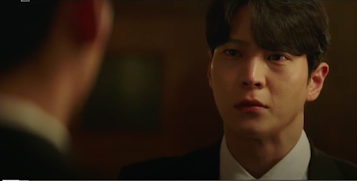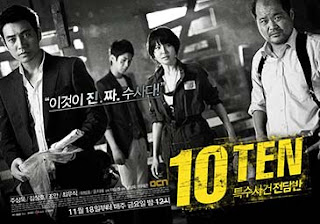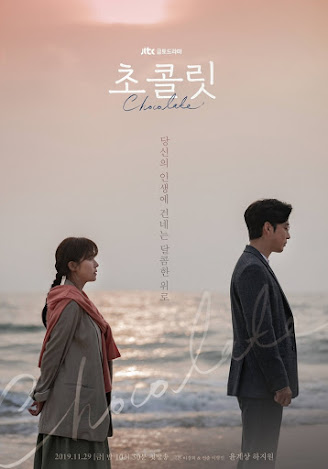At the risk of sounding reductionist, (and with some benefit of hindsight) it feels like every single K drama that I've watched this year is fundamentally about family even if it comes under the guise of time travel or crime or psychothriller. This one is no different. While I wouldn't be recommending my favourites this year under the "family" tag necessarily, the exploration of family and what that looks like seems to be a strong common denominator in all of them including, I would contend, the likes of 365: Repeat the Year. It makes sense on so many levels to insert that kind of emphasis as it is a universal phenomenon that resonates with people everywhere. Whether your birth or adoptive families are roaring successes on one side of the spectrum or whether they're abject failures on the other end, it's a key part of the human condition. Needless to say, there are a wide array of experiences one way or another, with nuances in between. My youngest was rewatching Avengers: Infinity War just the other day and I happened to listen in during the scene in which Thor unexpectedly consoles Gamora about the dysfunctionality of their respective families and then Peter Quill interjects and rants about his father.
On watching the last couple of episodes, I am struck again by how much Alice is fundamentally about family -- the institution as well as the people who form these units. Strip away the time travel mumbo jumbo, the body pile-up and the perpetrator hunt, this show explores family in all its glory and messiness. Space and time be damned... nothing can diminish the pull of family ties. Eventually those who need to find each other... will do so at the right time.
Because of the tyranny of the urgent present, it's easy to forget that Jin-gyeom is a man out of time. His alexithymia should remind us that he is someone that doesn't really belong in our present. It might be true that he's not a man of the future either. Perhaps that's why he's The Chosen One to close the door on time. Not unlike Neo from The Matrix. Born to a single mother who was time hopping, he personifies the cosmic anomaly that is destined to disrupt. While he might not be the second coming Jesus Christ, he might be a saviour of sorts. This would certainly explain why Mother Tae-yi wanted him to live, no matter the cost to her. It could be as she claimed that her maternal instincts kicked into gear. Before that day would come, however, he would be a special needs child that she struggled to raise until the day she died. When she was gone from his lonely existence, it gradually dawned on him what he had lost forever: Family. But it also fuelled an obsession to put the cuffs on her killer. After being adopted by Go Hyeon-seok, a father-figure for a decade of his life, Jin-gyeom begins to see how the "family thing" works. Everyone emphasizes this fact almost to ad nauseum. Jin-gyeom has been noticeably changing. He isn't what he was 10 years ago. During that time they have developed something akin to a father-son relationship which is why he can't bring himself to confront Go Hyeon-seok about what he may or may not have done (despite his stated resolve) or even point the finger at him. Ironically, the changes in Jin-gyeom in his journey to becoming "more human" creates a dilemma he might otherwise not have. Developing familial affection is now a stumbling block to Jin-gyeom's most cherished goal of finding Mum's killer.
The timely intervention of Min-hyuk into this morass of familial confusion is one that I welcome with open arms. Of course it doesn't hurt that he's easy on the eyes and has a voice that's music to the ears. ;) But watching him play out his introspections of late, my heart went out to him. He has all the qualities of the classic tsundere male lead. Far from being the aloof creature people assumed he was, he cares a lot and probably more than a man in his position should. Now that he knows the truth of what happened to his Tae-yi, the woman he loved, the mother of a son he never knew existed, he has much to regret. I appreciated his honesty. He can't even bring himself to blame his colleague, O Si-young, to any great extent because he can see that he was part of the problem. He was angry to the point of resentment and bitterness. At the time he thought only about himself and didn't consider the ramifications for Tae-yi and the child she was carrying. Having now been given the bigger picture, he not only accepts blame but it's finally sunk in what he's lost: Family. He is well aware that he can't just rock up to Jin-gyeom and announce their relationship to him because he had in some fashion lost all rights to him when he abandoned Tae-yi to her own devices. He had lived as if it didn't matter but the truth was... it did. It cut deeply. In bitterness he chose to stay away. When we get down to the brass tacks... he was an absent father.
Herein lies the crux of the issue. Family is so vital that people are willing to live, die and even kill for family. It's much easier realise all of that when we lose someone we love. Time is really not on our side in that regard. Holding on to grudges means that we lose opportunities that we regret later.
It's difficult to muster any sympathy for O Si-young. Her infatuation for Min-hyuk while understandable doesn't give her the right to withhold crucial information about Jin-gyeom. There was a boy who lost his mother who needed his father. Even if her falsehoods were motivated by jealousy and selfishness, she's still not entirely in the clear with regards to Future Tae-yi's murder in 2010. She mightn't have fired the shot but it doesn't necessarily preclude her from being part of a conspiracy led by the Teacher. How much can we trust her? A drone was present at the night of the murder. Does that denote her presence? What about her cryptic comments to Jin-gyeom about everything being Tae-yi's fault. Did she watch it happen and did nothing? There's a streak of callousness intermingled with resentment accompanying her words. In her eyes, Tae-yi was a nuisance then and continues to be a nuisance now long after her departure.
I maintain (and this last episode really bore that out in clear terms) that Jin-gyeom's relationship with Prof. Tae-yi is familial rather than romantic. I found Do-yeon's conversation with Tae-yi helpful in that regard. Through her the show was articulating in very clear terms that Jin-gyeom's fixation with the good professor was due to her striking resemblance to his mother. She also correctly pointed out (as someone who understands him better than most people give her credit for) that Jin-gyeom has finally had his emotional growth spurt and is now trying to make up for lost time. Do-yeon basically stated everything I have said here and elsewhere about Jin-gyeom's attitude to Professor Tae-yi. Now that Jin-gyeom understands the value of family, warts and and all he is clinging on to what he does have, lest his loses it all again.
Tae-yi's response to Do-yeon also strongly indicates that her concern for Jin-gyeom is not about romance. I can't imagine that the vast majority of women would be flattered by a man's attention because she was a dead ringer for his mother. It's not exactly Effective Pick-up Strategies 101. On top of that, Tae-yi seems to have matured overnight returning to 2020 much more appreciative of family and what she has.
Part of the problem of why we're having issues with the leads' dynamic has in part to do with the way we watch K dramas. Or have been brainwashed to make sense of the details. There may be an assumption that just because a male and a female are the leads, they automatically have to be in some kind of romantic pairing. I'd like to believe it's not the case here. And it's not the first K drama that doesn't follow the traditional kdrama stereotypes of what constitutes a male or female lead. In all honesty, whether deliberate or unconsciously, the show seems to have opened itself to that kind of interpretation too with its hamfisted and ambiguous use of common rom com cliches. Bad first impressions. Misunderstandings. Cohabitation. Whenever the leads embrace, cue: the emotional ballads.
The contrast in Jin-gyeom's attitude towards his birth father and his adoptive one was stark. Seeing Min-hyuk next to the body of Lee Se-hoon, he accuses him immediately, strikes quickly and hard. His birth father is a suspicious stranger whose motives can't be trusted. With Go Hyeon-seok, he hesitates and holds back even when he knows the truth of what he's done because of their long-standing relationship. Was all the goodwill on Hyeon-seok's side a lie? I don't think so. The flashback from 2014 is proof of something. Whatever ulterior motives he might have had, Go Hyeon-seok cared for the orphaned Jin-gyeom beyond whatever guilt he might have felt. However, as he himself acknowledges later, when the crunch comes, it seems that Hyeon-seok has other priorities and Jin-gyeom is relegated to the back seat.
I very much doubt that doppelgangers are at play here either. All this rigmarole about all the Tae-yi manifestations being different persons... sounds dubious. If this show is about parallel universes I'll eat my hat. All I'm seeing appear to be causal loops thus far. I know that the characters keep throwing the multiverse concept around but I'm not buying it. Unless it's a case of...
Plus, without trying to sound self-aggrandizing here, if this is really about parallel universes, the show is doing a ridiculously bad job of it.






















































